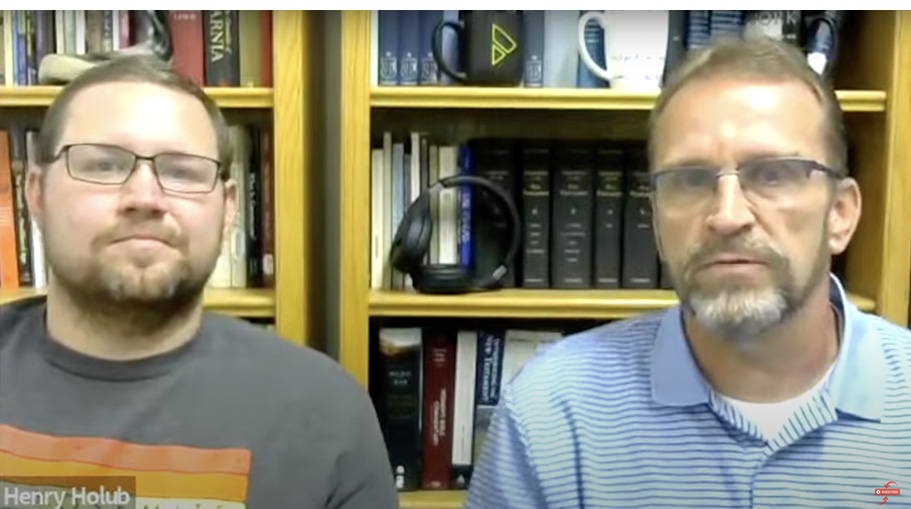
By Melissa Wuske
When Henry Holub moved to Spokane, Wash., in early 2020 to minister with Northside Church of Christ, a noninstrumental church, one of his first orders of business was to meet with Troy Burns, pastor of Sunrise Church of Christ, an independent Christian church. That meeting has led to a growing partnership between their churches that transcends their differences.
They shared their full story recently with Misty Cate of Common Grounds Unity. (The interview is available via CGU’s YouTube channel.)
“Henry deserves all of the credit for getting the ball rolling on our unity efforts,” Burns said.
“Troy can laud my efforts all he wants, but it would have been very, very easy for him to write me off,” said Holub. “He’s been at Sunrise for longer than I’ve been in ministry.”
It wasn’t the first effort to bring the churches together. They’ve been in and out of relationship for nearly half a century, and many in the congregations know each other from school and other parts of the community. But the connection each church prayed for had never deepened.
COVID-19 AND PRAYER SPURRED CHANGE
Shortly after Burns and Holub first met, the pandemic shut down much of the nation. While it slowed the pace of their connection, it turned out to be surprisingly helpful.
“It was really difficult to gain momentum for nearly two years,” said Burns. “Once the restrictions loosened, Henry was right back at it, and he encouraged our leadership teams to meet together multiple times. He and I have also met often, just the two of us.”
“Without the disruption COVID caused,” said Holub, “I’m not sure we’d have gotten here; certainly not this quickly. With so much ‘normal’ gone, there was an opportunity to do another ‘new’ thing.”
But there was another key element to change hearts: prayer. Both congregations had prayed for unity between them.
“I think prayer put our church in position to pursue the opportunity when it came about,” said Holub. “Northside’s concerns about unity have been prayerfully addressed predating my arrival in 2020, but I’m not sure they always knew what it would look like.”
“Prayer is about aligning myself with God’s will, not trying to make God conform to my will,” said Burns. “I believe that God is answering our prayers because he wants his children to get along.”
WORSHIPPING TOGETHER
In 2021, the churches worked together on a Halloween event for the community, and they’ve enjoyed each other’s company while rock climbing. This year, they hosted a joint worship service the Sunday after Easter. They blended volunteers from both churches to lead the service, including a cappella worship. Burns and Holub took turns preaching on a shared Scripture passage.
Since worship styles are a key difference between the congregations, sharing music together was particularly powerful.
“Although my own congregation uses musical instruments,” said Burns, “I must say that it was very powerful to have an a cappella worship service where I could hear other people sing and, because of that, the words almost carried an extra meaning to them. I had a very strong sense of singing together, which highlighted the unity we’ve been experiencing as congregations.”
“Having another entire congregation giving voice to a cappella worship was a powerful experience for us who worship that way week in and week out,” said Holub.
Since then the congregations hosted a worship night in a local park—with a guitar—and they’re planning another joint service and community Halloween event for October.
IT’S WORTH IT
To other churches thinking about joining in unity with other congregations in their area, both pastors send the resounding message: It’s worth it!
Burns shares his biggest advice: “Avoid the mindset of this has never worked before.”
“I think some churches like the idea of unity, but fear of competition ends up being the biggest hurdle for some leaders,” said Holub. “A decade ago, I’d have unfortunately carried that mentality into the project. But a lot of small things have built towards me letting go of that fear.”
Both pastors said it’s vital to be open to difficult conversations, but both have been surprised by how few of them they’ve had.
“I look forward to a time when news about what’s happening between Northside and Sunrise isn’t news in our church circles,” said Holub.
Melissa Wuske is a freelance editor and writer. She and her husband, Shawn, and their son, Caleb, live and minister in Cincinnati. Find her work online at melissaannewuske.com.

But… they’ll still send their young men to war, practice an open communion that is mere memorial, and all the other changes made away from what the Restoration Movement predominantly taught originally. Isn’t it amazing how the Bible apparently changes in such short periods of time. 1 Tim. 3:15